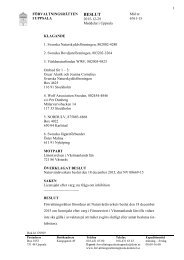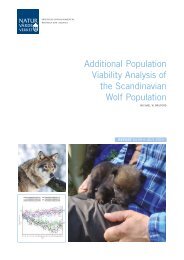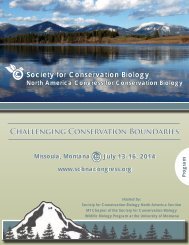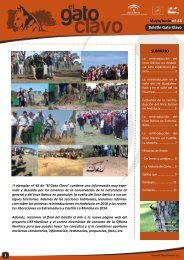1oC3Dbk
1oC3Dbk
1oC3Dbk
You also want an ePaper? Increase the reach of your titles
YUMPU automatically turns print PDFs into web optimized ePapers that Google loves.
In 2013, the Specialist Group has been rigorously working<br />
on The IUCN Red List Index as a plant indicator in<br />
Macaronesia together with mainland Spain. 2013 has been an<br />
important year for the promotion of knowledge on selected<br />
species (actually recognized as threatened species) of the<br />
Canary Islands, by monitoring their population dynamics on<br />
the seven islands.<br />
Ángel Bañares Baudet<br />
Chair, Macaronesian Island Plants Specialist Group<br />
Madagascar Plant Specialist Group (MPSG)<br />
In 2013, Prof. Vololoniaina Jeannoda was elected as the new<br />
chair of the MPSG, in replacement of Prof. Charlotte<br />
Rajeriarison, who retired from a task that she has carried out<br />
since the creation of the group in 2002. Prof. Jeannoda has<br />
also now been appointed as a member of the SSC steering<br />
committee, and attended the steering committee meeting in<br />
Mexico in November 2013. The goals of the MPSG are the<br />
same as those of the SSC. One of them is to guarantee the<br />
rational use of natural resources in a fair and sustainable way.<br />
In order to achieve that goal, the MPSG is also acting as a<br />
member of the CITES Flora Scientific Authority and is strongly<br />
involved in national CITES activities.<br />
In 2013, the MPSG has contributed to the inscription of a<br />
number of succulents, as well as all Madagascar endemic<br />
rosewood and ebony wood species, in CITES appendix II. The<br />
MPSG chair and two other members of the group, one of<br />
which is the chair of the Madagascar Flora Scientific Authority<br />
for CITES, were part of the Madagascar delegation to CITES<br />
COP 16 in Bangkok, and successfully presented the relevant<br />
documents to the CITES general assembly. Following that, 30<br />
MPSG members benefited from five days training on Non<br />
Detrimental Finding (NDF – which was funded and carried out<br />
by the CITES General Secretariat in Switzerland). Lastly, in<br />
keeping with the Madagascar CITES action plan, NDF<br />
fieldwork was carried out on various species of succulents and<br />
precious woods by other members of the MPSG, which also<br />
Pachypodium rosulatum var. gracilius. © Aro Vonjy Ramarosandratana<br />
led to the identification of The IUCN Red List conservation<br />
status for these species.<br />
Vololoniaina Jeannoda<br />
Chair, Madagascar Plant Specialist Group<br />
Mangrove Specialist Group (MSG)<br />
The continual worldwide destruction of mangroves resulting<br />
from urban development, aquaculture and agriculture is the<br />
main impetus for the establishment of this Specialist Group.<br />
While most species of mangroves have relatively large<br />
geographic ranges, some species and habitats are subject to<br />
dire threats of extinction. The formation of a Mangrove<br />
Specialist Group was initially discussed at the July 2012 MMM3<br />
Meeting on Mangrove Ecology in Sri Lanka. Following various<br />
exchanges, the MSG was finally established in early 2013 with a<br />
current membership of 47, mostly from South Asia, East Asia<br />
and 17 from Europe (South America and Africa are underrepresented).<br />
The Zoological Society of London (ZSL) provides<br />
administrative support to the MSG.<br />
The first MSG meeting held on 15 October 2013 was<br />
attended by 18 MSG members. Among the topics presented<br />
were; aligning the MSG work with the IUCN 2013–2016<br />
programme; defining the roles and responsibilities of MSG<br />
members, and outlining the current state of global projects and<br />
research. Subsequent discussions came up with actions to be<br />
taken by the Group; flag mangrove-related species for The<br />
IUCN Red List; link with other ecologists within other Specialist<br />
Groups; contact current mangrove projects such as Mangroves<br />
for the Future, and to establish synergies and avoid duplication.<br />
An open symposium the next day featured 12 papers on<br />
Mangrove Ecology, Climate Change, Blue Carbon, Payment<br />
Ecosystem Services, and Mangrove Rehabilitation and<br />
Restoration with 29 participants from various international<br />
organizations. A visit to the Royal Botanic Gardens Kew ended<br />
the day. A symposium entitled ‘Turning the Tide on Mangroves’<br />
(plus a two-day workshop for MSG members) is scheduled for<br />
6–7 November 2014, at the Zoological Society of London.<br />
Dr Jurgenne Primavera and Professor Joe Lee<br />
Co-chairs, Mangrove Specialist Group<br />
MSG Group Photo (15 October 2013).<br />
66 IUCN species Annual Report 2013






